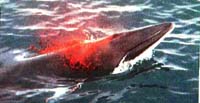Anti-whaling activists get lost in freezing Antarctic waters
Searchers in freezing Antarctic waters found two anti-whaling activists Friday after their Zodiac dinghy got lost in heavy fog, the international conservation group Sea Shepherd said.

The Farley Mowat, a Sea Shepherd protest ship, plucked the pair - a U.S. citizen and an Australian - from the sea more than seven hours after they went missing in the fog while confronting Japanese whaling craft, the Farley Mowat's skipper Paul Watson told The Associated Press by telephone.
Watson Karl Neilsen from Perth, Australia and John Gravois from Los Angeles in the U.S., were picked up in good condition from a Zodiac high-speed inflatable dinghy whose fiberglass hull had cracked during the melee.
The pair had been wearing survival suits and carrying a GPS navigation system, he said.
"They hunkered down, kept hydrated and waited to be found," said Sea Shepherd's international director, Jonny Vasic.
The pair had last been seen near a Japanese whale processing ship as protesters in three Zodiacs confronted the Japanese whalers, causing them to abandon a chase for a pod of whales, the AP reports.
Watson said the two activists got lost after fog, mist and drizzle blanketed the area at about 9:00 a.m. New Zealand time (2000 GMT Thursday).
Watson said Japanese whale processing ship Nisshin Maru had responded to Sea Shepherd's call for help in searching for the pair - and had joined Sea Shepherd's two vessels in a grid search of the area.
Glen Inwood, a spokesman for Japan's Institute for Cetacean Research, said the Nisshin Maru had received a mayday call from the protesters and had responded.
Inwood said the Japanese ships had turned back toward the protest vessels in a bid to help find the missing crew.
Watson said when he thanked the crew of the Nisshin Maru for their help, "they were very professional. They just said they'd wait for us (to resume the protest).
"I said, 'I guess we're back on schedule, and we'll be pursuing you again,"' Watson said.
Vasic had earlier reported the confrontation from aboard the group's other vessel, the Robert Hunter, which had been searching the Ross Sea for the Japanese whalers since December.
He said the anti-whaling activists had found four Japanese whaling ships about 1:00 a.m. New Zealand time Friday (1200 GMT Thursday), and had used the Zodiacs to try disrupting their operations.
The Farley Mowat and the Robert Hunter also engaged in the confrontation with the Nisshin Maru, Vasic said.
"We played cat and mouse with them throughout the morning," he said.
The Sea Shepherd's Web site said "there was a pod of whales in the area near the whalers. The Sea Shepherd crew is happy to report that these whales fled and are now safe from the Japanese harpoons."
It said the Sea Shepherd crew "has successfully delivered" six liters of butyric acid onto the Nisshin Maru's whale-butchering deck.
It said the non-toxic but foul-smelling acid "stopped all work of cutting up whales."
Activists in Zodiacs also used nail guns to fasten plates onto the Nisshin Maru's drain outlets, which spill whale blood into the sea.
Vasic said Sea Shepherd had told the four Japanese vessels by radio that they were breaking international conservation law by whaling in an Antarctic sanctuary, but had received no reply.
He said the whalers had yelled at them through loudspeakers and "had their water cannon spraying full blast - but that is fairly easily avoided."
In the past, Sea Shepherd has rammed other craft to try to disrupt whaling.
"That would be a drastic tactic used as a last resort. We have no plans to do that yet," Vasic said.
Conservation group Greenpeace International, which also has anti-whaling vessels searching for the Japanese, said Friday that its ships would reach them within 48 hours.
Subscribe to Pravda.Ru Telegram channel, Facebook, RSS!



